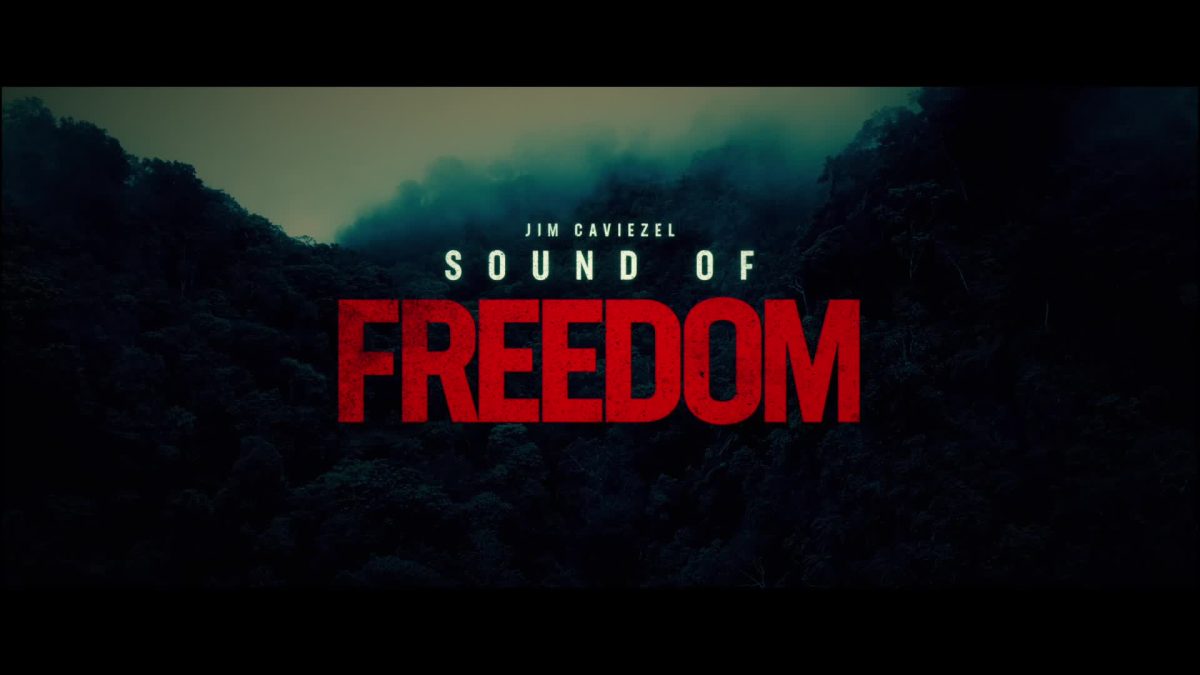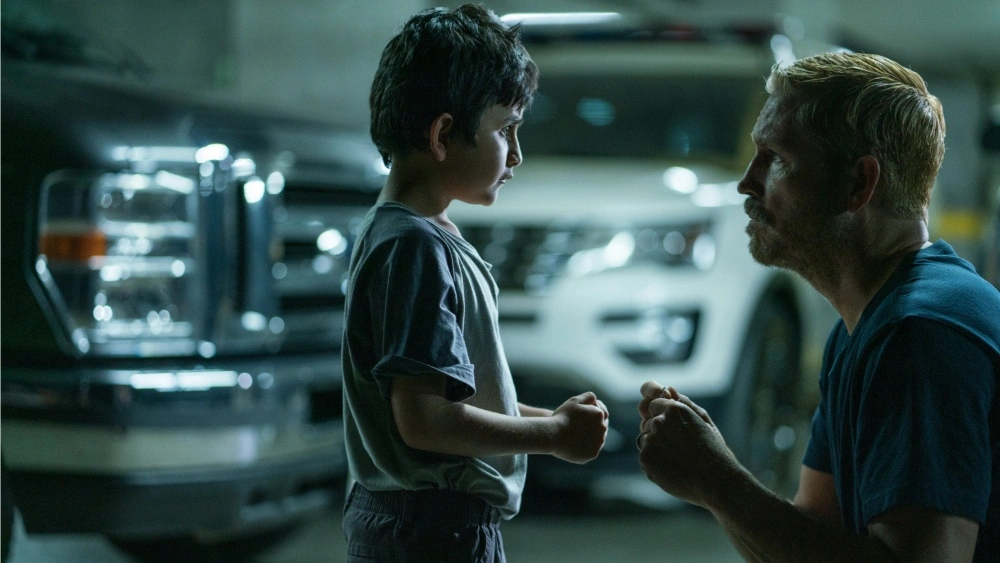Jim Caviezel Brings his best Jesus to this Disquieting Thriller About Child Sex Trafficking.

Firstly this is not a work of fiction, it is based on a real person’s (Tim Ballard) experiences fighting the global child trafficking industry. And it is an industry that has overtaken the illegal drugs trade in size. It argues that one of the reasons why this issue does not get the coverage in the news, or in films that it should is because there are so many rich and powerful people around the world who are a part of it.
“Sound of Freedom” informs us, Child Trafficking is the fastest growing international criminal network the world has ever seen. A closing title states — accurately — that there are more people enslaved now, by sex trafficking, than there were when slavery was legal. And the nightmare lived by captured children is unspeakable, unimaginable…and all too real.
Let’s be clear: This matters more than the cocaine or opioids industry.
Emanating an air of disquietude, the cinematic masterpiece known as “Sound of Freedom” captivates viewers with its masterful execution and profound exploration of the unsettling world of child sex trafficking. While labeled as a “conservative” thriller, one need not subscribe to a specific ideology to become enthralled by its narrative.
Drawing inspiration from the remarkable true story of Tim Ballard, a former Department of Homeland Security special agent who dedicated his life to combating the abhorrent crime of child sex trafficking, “Sound of Freedom” delves into the depths of this harrowing issue. Ballard’s unwavering determination led him to establish Operation Underground Railroad, a private initiative supported by the indomitable Glenn Beck.
At the heart of this riveting tale is the incomparable Jim Caviezel, renowned for his portrayal of the titular role in Mel Gibson’s monumental masterpiece, “The Passion of the Christ.” Caviezel, adorned with a meticulously groomed dark beard and resplendent coppery blond locks, embodies the character of Ballard with an ethereal blend of righteousness reminiscent of a celestial warrior, the unwavering conviction of George C. Scott’s character in “Hardcore,” and the redemptive fervour of Jesus Christ himself.
Within the fabric of this film lies a current of Christian ideology, occasionally surging forth with such intensity that it transcends mere undertones. One poignant instance occurs when Ballard, driven by an unwavering purpose, elucidates the reason for his unyielding fixation on combating trafficking: “Because God’s children are not for sale.” The marketing campaign for “Sound of Freedom” has heavily targeted right-wing media platforms such as Ben Shapiro’s Daily Wire. Someone this author cannot stand.
Inevitably, this fact evokes a grand subtext—a subtle connection to the alt-right paranoia that originated from the depths of 4Chan and QAnon.

This particular strain of conspiracy theory propagated the notion of a clandestine pedophile ring operating within a Washington, D.C. pizza parlour, expanding its reach to encompass a larger framework that implicates the entire liberal culture as a shield for a cabal of pedophiles.
It must be unequivocally stated that such narratives are nothing short of absurd and delusional. However, let us suppose that, like myself, you are not a right-wing fundamentalist conspirator actively seeking a dark, faith-based thriller to grace your viewing experience. Instead, you crave a film that delves into the realms of suspense, a tapestry woven with shadows and imbued with a sense of unease.
Even in the absence of extreme convictions, one can still find “Sound of Freedom” to be an enthralling cinematic experience, as it fearlessly illuminates one of the most heinous criminal atrocities of our era—a subject that Hollywood has largely shied away from.
Completed in 2018, the film faced an unfortunate fate when it was shelved by Disney following their acquisition of 20th Century Fox, its original studio. However, it has since been repurchased and is now being independently distributed, allowing its powerful message to reach audiences. Did anyone mention that Hollywood elites are supposed to be active players in Child Trafficking rings?
Reflecting on the vast array of movies and TV shows that have explored the realm of drug trafficking, it becomes evident that society has been inundated with such narratives. In stark contrast, child sex trafficking is a topic that does not readily lend itself to conventional notions of “entertainment.”
Nevertheless, “Sound of Freedom” sheds light on the alarming reality that it represents the fastest-growing international criminal network in history. A closing title presents an indisputable fact: there are presently more individuals enslaved by sex trafficking than during the era of legal slavery. The unimaginable horrors endured by these captive children are beyond words, beyond comprehension, and tragically, all too real. Let us be unequivocal: this issue holds far greater significance than any trivialities that may divide us. It demands our attention, our empathy, and our collective action.
Beyond the realms of the cocaine or opioids industry lies a cause that surpasses them in significance, and that is the very essence of “Sound of Freedom”.
A film like “Sound of Freedom” serves a vital purpose—it serves as a clarion call, a piercing alarm that resounds in a way that journalism often cannot. It ventures into the forbidden, uncharted territories, where the depths of our primal emotions are stirred, invoking empathetic terror. However, it must be acknowledged that “Sound of Freedom” does not belong to the realm of artistry in the same vein as Lukas Moodysson’s remarkable work, “Lilya 4-Ever” (2002), which remains the solitary masterpiece to tackle the subject of sex trafficking.
Regrettably, it went largely unnoticed, despite its extraordinary quality. In contrast, “Sound of Freedom” falls under the guise of a genre thriller. Nevertheless, it imparts a sense of urgency and integrity, and in this endeavour, Jim Caviezel delivers a performance that rivals his exceptional portrayal in “The Passion of the Christ.” Seasoned and refined, he exudes the smouldering aura of a more tender-hearted Clint Eastwood. He possesses the art of understating the depths of rage and despair, while bringing an authentic, lifelike quality to the perilous journey of going undercover.
Meanwhile, Agent Ballard, an experienced law enforcement officer, finds himself once again ensnaring an online consumer of child pornography.
Over the course of his 12-year career, Ballard has successfully apprehended approximately 280 individuals involved in pedophilia. Yet, what deeply troubles him is not only the heinous nature of these crimes or the harrowing videos he must endure, but rather the fact that he apprehends the offenders without rescuing the innocent children involved.
To gain the trust of his latest target, Ballard employs a cunning strategy. He convinces the suspect that he shares the same dark inclinations, subtly implying that he himself is a secret pedophile. Through this ruse, Ballard manages to uncover a crucial link in the trafficking network, prompting him to launch an operation to capture the trafficker responsible. Finally, at the Mexican border, Ballard successfully apprehends the trafficker and, in doing so, rescues the young boy from the distressing situation depicted in the opening scene.
However, the fate of the boy’s sister continues to haunt Ballard, eating away at him day by day. It becomes his mission, his all-consuming obsession—to save her from the nightmare she is trapped in. Ballard, a devoted family man, is married to Katherine (played by Mira Sorvino) and together they have six children. In the film’s Christian perspective, Rocio, the young girl, becomes an extension of their own family. The belief is that all children are God’s children and, therefore, they are all our responsibility.
However, this faith-based approach is overlaid onto a situation that doesn’t inherently require it. Ballard has made a personal decision to pursue the traffickers themselves, a task that seems nearly impossible and lacks support from the Homeland Security apparatus. His boss gives him a mere week and a meagre sum of ten thousand dollars to accomplish his mission. As Ballard embarks on his journey to Colombia, the film truly comes alive as an exhilarating undercover thriller.
What adds to the film’s intensity is Ballard’s main contact, Vampiro, an American expatriate portrayed by the talented Bill Camp. Vampiro, who used to launder drug money for the cartels, exudes a shady and sinister aura, reminiscent of a character one could envision Hemingway conjuring if he had lived into modern times.
After serving time in prison, Vampiro has been on a path of redemption, trying to make amends for his sinful past.
However, remnants of his sordid life still cling to him, and Bill Camp portrays him as an exuberant yet morally questionable character who maintains connections with the most despicable individuals imaginable. Ballard, recognising the potential in working with Vampiro, teams up with him to devise a plan: they will create a fictitious exclusive club catering to wealthy pedophiles. Their intention is to ensnare the local traffickers operating in the area, among them Katy-Gisselle, a former beauty queen.
For a certain stretch of time, the film takes on the gritty atmosphere of a particularly grim episode of “Miami Vice,” immersing the audience in a world of shadows and moral decay. The duo’s scheme unfolds, blurring the lines between justice and deception, as they delve deeper into the dangerous underbelly of the trafficking network.
However, Ballard’s journey takes an intense turn reminiscent of “Apocalypse Now” as he ventures deep into the jungles of Nariño Province, a stronghold for rebels. Within this treacherous territory, Rocio is held captive by the chief rebel, Scorpio, forced into a life of slavery. Ballard and Vampiro adopt the guise of U.N. doctors, allowing them access to the rebel camp, which doubles as a cocaine production facility.
Director Alejandro Monteverde masterfully orchestrates this sequence, avoiding sensationalism and hyperbole. The depiction of danger is grounded and authentic, devoid of the exaggerated spectacle found in typical “Rambo” movies or Netflix thrillers masquerading as profound narratives. When the long-awaited moment of deliverance finally arrives, it feels earned. In a conventional yet powerful manner, we catch a glimpse of the darkness that resides at the core of our world. It evokes a sense that the call to “take action” extends beyond a mere gesture performed in action films—it becomes a response to a profound truth about our reality.
Let’s hope that this film will shine a light on one of humanities greatest ongoing atrocities and galvanise some coordinated efforts to wipe it out.
Subscribe to FIB’s Weekly Breaking News Report for your weekly dose of music, fashion and pop culture news!







